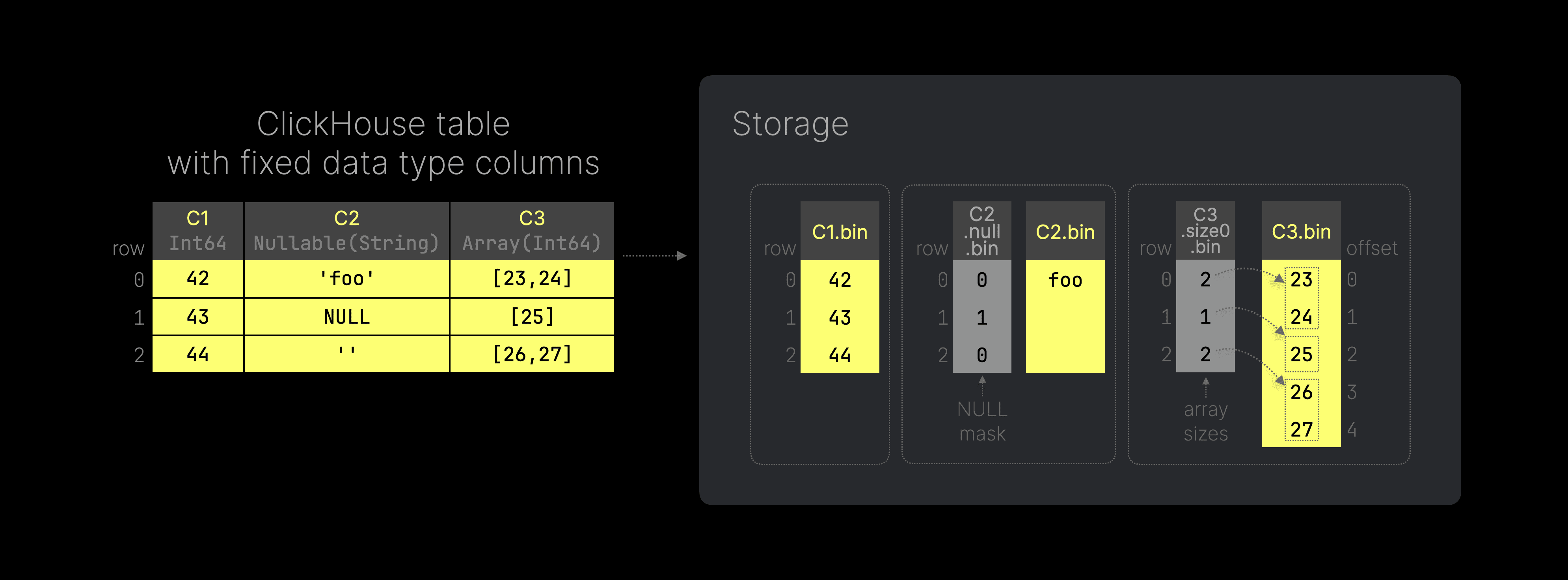
Use cases for Clickhouse’s spicy new JSON column type
In October of 2024, Clickhouse announced a powerful new JSON data type that has been causing the community to buzz with excitement and anticipation over the possible use-cases and potential POCs.
In October of 2024, Clickhouse announced a powerful new JSON data type that has been causing the community to buzz with excitement and anticipation over the possible use-cases and potential POCs. The JSON type is a overhaul of the OBJECT data type with some major improvements to flexibility and storage.
Reason for the overhaul
The previous OBJECT type in Clickhouse had several limitations that made it suboptimal for handling JSON data at scale. It lacked efficient storage mechanisms for nested structures, required explicit type definitions, and struggled with schema evolution. These constraints often forced developers to either denormalize their data or implement complex workarounds, leading to reduced performance and increased maintenance overhead. The new JSON type addresses these pain points while maintaining Clickhouse’s signature high-performance characteristics.
The decision to rebuild the JSON type from scratch came from a deep understanding of how modern applications handle JSON data. With the rise of document stores, semi-structured data, and flexible schemas in modern architectures, Clickhouse needed a solution that could handle these use cases without compromising its analytical capabilities. This overhaul represents a significant step forward in making Clickhouse more versatile for modern data architectures.
Challenges in building a JSON type
Building a robust JSON type for a column-oriented database like Clickhouse presents several unique technical challenges that needed to be carefully addressed. The team had to balance performance, storage efficiency, and query flexibility while maintaining Clickhouse’s core strengths in analytical processing. These challenges required innovative solutions and careful architectural decisions to ensure the new JSON type would meet the demands of modern data workloads.
Challenge 1: True column-oriented storage
One of the primary challenges in implementing a JSON type in a column-oriented database like Clickhouse is maintaining true columnar storage while handling nested JSON structures. Traditional row-oriented databases can simply store JSON as text blobs, but this approach would negate the performance benefits of columnar storage. The team needed to develop a way to efficiently decompose JSON objects into a columnar format while preserving the ability to reconstruct them accurately during queries.

Challenge 2: Dynamically changing data without type unification
Another significant challenge was handling dynamically changing data structures without forcing type unification across all records. In traditional databases, schema changes often require migration or transformation of existing data. The Clickhouse team needed to develop a solution that could accommodate varying JSON structures within the same column while maintaining query performance and avoiding the overhead of type coercion.
Challenge 3: Prevention of avalanche of column data files on disk
A critical challenge in implementing JSON support was preventing an explosion of column data files on disk. When dealing with deeply nested JSON structures, a naive implementation could lead to the creation of numerous small files for each nested field. This would not only impact storage efficiency but could also create significant overhead for file system operations and potentially degrade query performance.
Challenge 4: Dense storage
Dense storage presented another key challenge for the JSON type implementation. The team needed to develop compression techniques that could efficiently store JSON data while maintaining quick access times for queries. This required careful consideration of storage formats and compression algorithms that could handle both structured and semi-structured data effectively.
The essential building blocks
The new JSON type in Clickhouse is built on several key architectural components that enable its powerful capabilities while addressing the challenges mentioned above. These building blocks work together to provide a flexible, performant solution for handling JSON data at scale. Understanding these components is crucial for grasping how Clickhouse achieves its efficient JSON handling capabilities.
Variant Type
The Variant Type is a fundamental component of Clickhouse’s JSON implementation that allows for flexible storage of different data types within the same column. It efficiently handles multiple data types (strings, numbers, booleans, arrays, and nested objects) without requiring predefined schemas. This type system enables Clickhouse to maintain high performance while accommodating the dynamic nature of JSON data structures.

Dynamic Type
The Dynamic Type component builds upon the Variant Type to provide runtime type checking and validation for JSON data. This mechanism ensures type safety while maintaining flexibility, allowing Clickhouse to efficiently process and query JSON structures without compromising performance. The Dynamic Type system also facilitates seamless schema evolution, enabling applications to adapt to changing data requirements without requiring database migrations or downtime.
Use Cases for JSON type
The new JSON type in Clickhouse opens up several compelling use cases that leverage its improved flexibility and performance. Let’s explore some key scenarios where this feature particularly shines, demonstrating its practical applications in modern data architectures.
Event Data Processing
One of the most natural applications for Clickhouse’s JSON type is in processing and analyzing event data from web applications, mobile apps, and IoT devices. The ability to handle varying event structures within the same column while maintaining query performance makes it ideal for scenarios where event schemas evolve frequently or differ across sources.
For example, a mobile gaming company could use this feature to track player interactions, purchases, and gameplay events, where each event type might have different attributes. The JSON type efficiently handles these varying structures while allowing for quick analysis of player behavior patterns across different game versions and features. This flexibility is particularly valuable when new game features are introduced, as it eliminates the need for schema modifications while maintaining analytical capabilities.
Log Analysis and Troubleshooting
Application logs and system metrics often contain semi-structured data with varying levels of detail and different attributes depending on the log type or severity level. Clickhouse’s JSON type excels in this scenario by providing efficient storage and quick querying capabilities for log analysis and real-time monitoring.
ETL and Bulk Loading
The JSON type also proves invaluable for ETL processes and bulk data loading scenarios where source data structures may vary or evolve over time. Organizations can directly load JSON data from various sources without the need for upfront schema definition or complex transformation logic. This capability is particularly useful when integrating data from multiple systems or when dealing with third-party APIs that frequently update their data formats.
Additionally, this flexibility extends to data migration scenarios where organizations need to maintain historical data formats alongside newer structures. The JSON type allows for seamless schema evolution without requiring costly database migrations or downtime, making it an ideal choice for organizations with dynamic data requirements.
Schema Evolution and Migration
The JSON type’s ability to handle schema changes without requiring explicit modifications makes it particularly valuable for applications with evolving data structures. This feature enables organizations to maintain backward compatibility while gradually transitioning to new data formats, reducing the complexity and risk associated with traditional schema migrations.
Conclusion
The introduction of Clickhouse’s new JSON type represents a significant advancement in handling semi-structured data within a columnar database system. By addressing key challenges around storage efficiency, query performance, and schema flexibility, Clickhouse has positioned itself as a compelling option for modern data architectures that require both analytical power and JSON handling capabilities. Organizations looking to simplify their data infrastructure while maintaining high performance for JSON workloads should consider exploring this new feature as part of their data strategy. If you’d like to explore a POC using the Clickhouse JSON type after the new year, set up a free consultation now.
